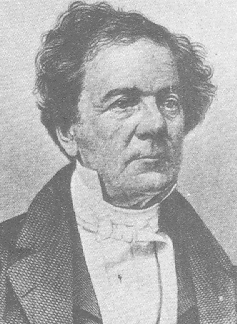Lewis Tappan was the New York abolitionist who, in the opinion of John Quincy Adams, was most responsible for securing the freedom of the Africans of the Amistad. Contacted by Connecticut abolitionists soon after the Amistad was towed into port, Tappan dedicated himself to securing high quality legal representation for the captives, raising money for their defense and provision, increasing public support for their cause, recruiting teachers to provide them instruction, and finally arranging for their return to their African homeland.
Lewis Tappan and his brother Arthur were successful merchants who helped found the American Antislavery Society. The Tappan brothers outspoken championing of "universal liberty" made them the targets of pro-slavery mobs and terrorists. In 1834, a mob broke into Tappan's home where an Antislavery Society meeting was being held. They threw his furniture out into the street, then burned it. The next year an unnamed person advertised a $100,000 reward to the person who would deliver the dead bodies of the Tappans to any slave state. Tappan was burned in effigy, attacked in the press, unable to purchase insurance for either himself or his possessions, and sent crude warnings in the mail ranging from pieces of rope to a slave's ear. For protection, Tappan carried only a copy of the New Testament in his breast pocket.
Tappan was a uncompromising moralist with views that many even in the abolitionist movement found rather extreme. For example, Tappan favored intermarriage as the long range solution to racial issues. He envisioned a "copper-colored" America where race would cease to be a defining characteristic. Tappan described slavery as "the worm at the root of the tree of Liberty." The Amistad's arrival on American shores was, he thought, a "providential occurrence" that might allow "the heart of the nation" to be "touched by the power of sympathy".
Tappan joined with Simeon Jocelyn and Joshua Leavitt to form the "Amistad Committee" that hired legal counsel, made key litigation decisions, and provided support of all kinds for the Africans. It was the decision of Tappan and the Committee to file civil suits in New York against Montes and Ruiz for assault, battery, and false imprisonment. The civil suits, though generating considerable anger and adverse publicity, succeeded in drawing public attention to the broader moral issues raised by the Amistad Affair.
Tappan attended each day of the Amistad trials and wrote daily accounts of the proceedings for the Emancipator.
After achieving legal victory in the Supreme Court, Tappan began plans to use the Amistad Africans as the nucleus for his dream to Christianize Africa.
ESSAY: "Stamped with Glory: Lewis Tappan and the Amistad Case"
MAIN BIOGRAPHY PAGE

